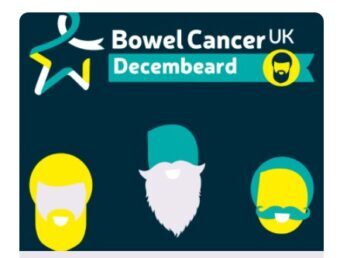Decembeard 2020
Decembeard and bowel cancer research. Decembeard is a fundraising opportunity that happens every December to raise money for Bowel Cancer UK. The money raised is used to help support research and work to stop bowel cancer. Men across the country are encouraged to clean shave on the 30 November and get sponsored to grow a beard throughout December, it is also a great opportunity to raise awareness of the symptoms and causes of bowel cancer.
What is bowel cancer?
‘Bowel cancer is a general term for cancer that begins in the large bowel. Depending on where the cancer starts, bowel cancer is sometimes called colon or rectal cancer’ NHS 2019.1
According to Cancer Research, bowel cancer was the 4th most common cancer in the UK in 2017 that affects both males and females. Between 2015 and 2017 there were approximately 110 new bowel cancer cases every day,2 with those over the age of 60 receiving the most diagnoses.1
Bowel cancer incidence rates are slowly decreasing3, however it still remains one of the most preventable cancers in the UK with an estimated 54% of bowel cancer cases being preventable.2
Causes and Symptoms:
Your age and family history are risk factors for bowel cancer that you cannot change, however there are a few risk factors which you can control. Try to reduce the amount of red and processed meats you eat and include more fibre in your diet, you should try to eat 30g of fibre per day4. Make an effort to limit the amount of alcohol you drink to no more than 14 units per week, spreading this evenly throughout the week.5 Strive to follow the government guidelines to be physically active every day, aiming for 150 minutes of exercise every week to decrease your risk of bowel cancer6.1
We can often shy away from talking about our bowel habits and think ‘oh it will pass in a few days’, but there are a few symptoms to be aware of and if experienced you should consult your GP. These include:
- Persistent blood in your poo
- A consistent change in your toilet habits
- A continual pain in your lower tummy pain.
For more information on the symptoms and causes of bowel cancer visit nhs.uk/conditions/bowel-cancer
Getting involved:
Anyone can get involved this December, it’s the taking part that counts. If you are unable to grow a beard your support to anyone who is taking part is greatly appreciated. If you already have a beard here are a few ways you can get involved:
- Ditch the beard. Why not get friends and family to sponsor you to shave off that beloved beard. Don’t worry…it will always grow back!
- Dye your beard. Choose whichever colour you like, why not try to make it festive with a green or a red, or both! Not only does this encourage the people around you to donate to BowelCancerUK, it is also a fantastic conversation starter, to raise awareness of bowel cancer.
- Decorate your beard. It is now more popular than ever to decorate your beard, with several high-street retailers selling beard accessories, including beard baubles, glitter and even small fairy lights. You can raise money for BowelCancerUK by decorating your beard every day.
Happy beard growing!
For further information:
To find out more or to get involved visit: https://www.bowelcanceruk.org.uk/support-us/fundraise/decembeard2020/
Remember to also check out the Love Your Gut resources here
References:
- NHS (2019). Available from: https://www.nhs.uk/conditions/bowel-cancer/
- Cancer Research UK (2020). Available from: https://www.cancerresearchuk.org/health-professional/cancer-statistics/statistics-by-cancer-type/bowel-cancer#heading-Zero
- Cancer Research UK (2020). Available from: https://www.cancerresearchuk.org/health-professional/cancer-statistics/statistics-by-cancer-type/bowel-cancer/incidence#heading-Two
- Scientific Advisory Committee on Nutrition (2015). Available from: https://assets.publishing.service.gov.uk/government/uploads/system/uploads/attachment_data/file/445503/SACN_Carbohydrates_and_Health.pdf
- NHS (2016). Available from: https://www.nhs.uk/news/food-and-diet/new-alcohol-advice-issued/
- GOV UK – Departments of Health and Social Care (2019). Available from: https://assets.publishing.service.gov.uk/government/uploads/system/uploads/attachment_data/file/832868/uk-chief-medical-officers-physical-activity-guidelines.pdf

